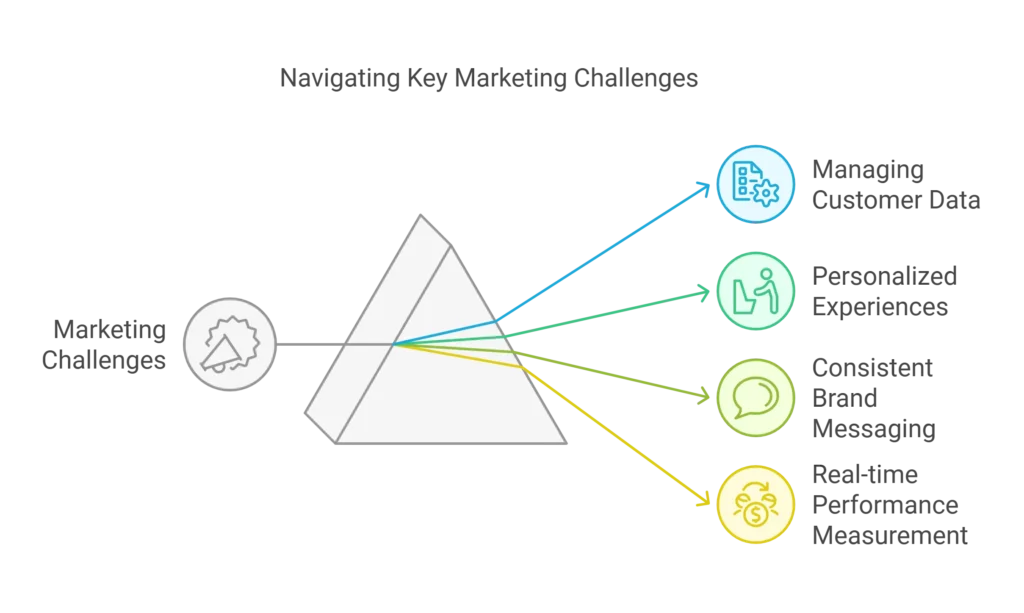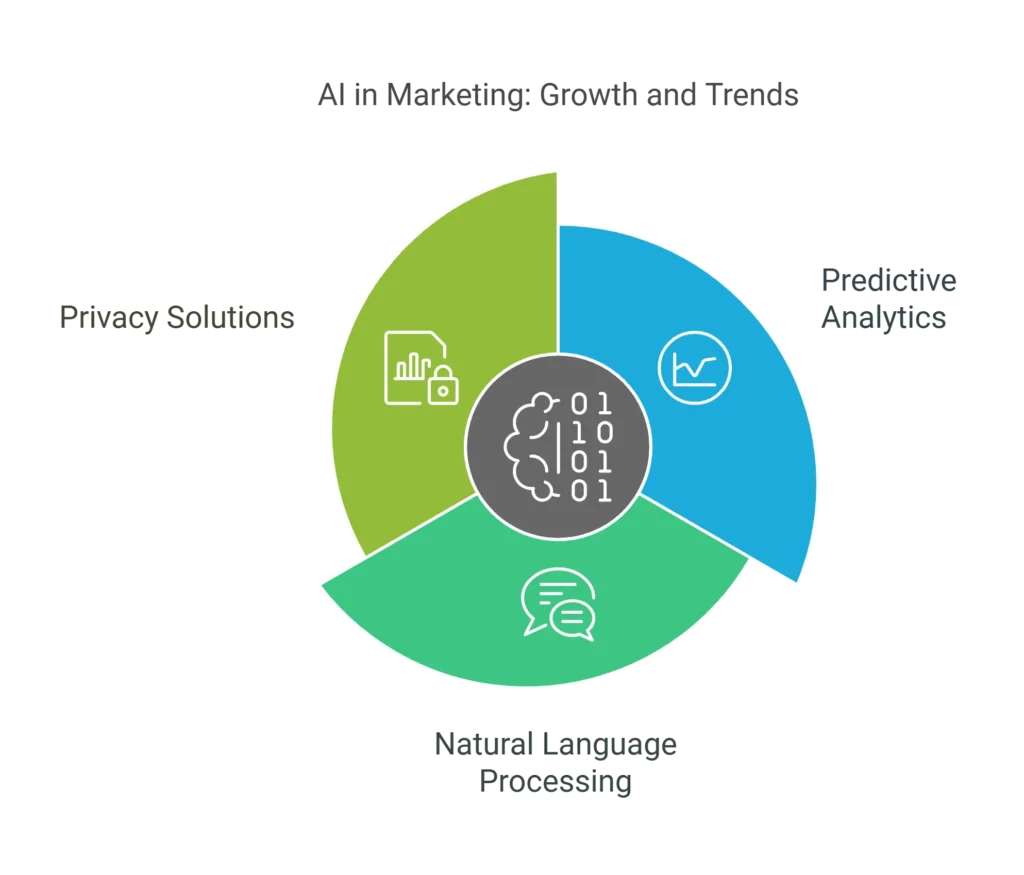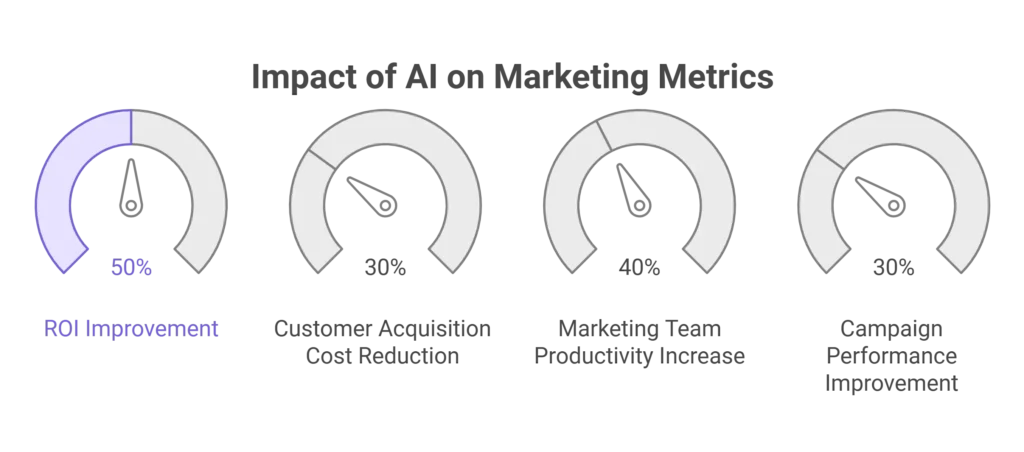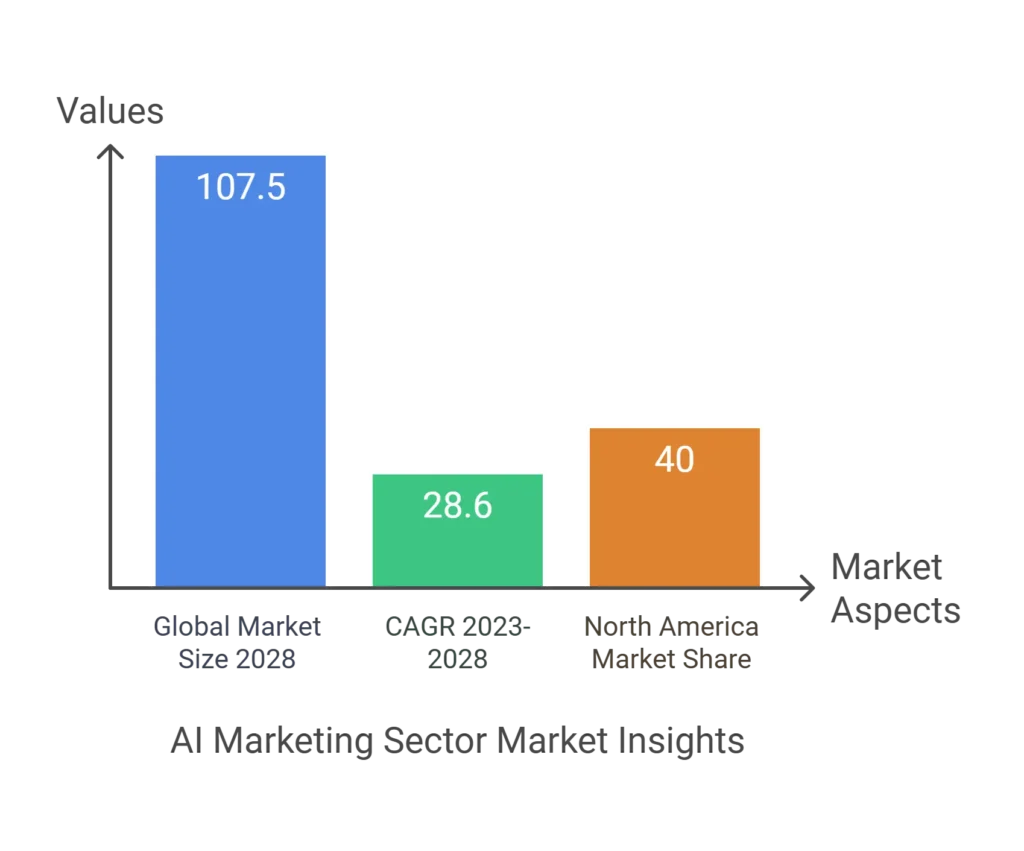AI in Streamlining Marketing Processes
According to recent research by Marketing AI Institute, 64% of marketing professionals believe AI in streamlining marketing processes will be critically important for success within the next year. In 2025, artificial intelligence isn’t just transforming marketing it’s completely revolutionizing how we approach customer engagement, campaign optimization, and data analysis.
If you’re wondering how to leverage AI to streamline your marketing processes while maintaining authentic customer connections, you’re not alone. A comprehensive study by TGM Research reveals that marketing leaders across industries face the challenge of balancing automation with personalization, all while managing increasingly complex data streams.
Maximize Your Marketing Potential with AI. Unlock the full potential of your marketing strategies with our detailed AI Marketing Automation Guide for 2025. This guide offers actionable insights and best practices to help you effectively integrate AI into your marketing processes and achieve measurable results.
Key Takeaways:
- Transforming Marketing Strategies: AI revolutionizes marketing with enhanced personalization, automated processes, and advanced consumer behavior insights.
- Overcoming Modern Challenges: AI tackles critical challenges like managing vast data, delivering personalized experiences, and optimizing campaigns in real-time.
- Data-Driven Decision Making: Intelligent data analysis, predictive analytics, and enhanced natural language processing drive more effective targeting and engagement.
- Proven Success Stories: Case studies show businesses achieving up to a 40% boost in campaign effectiveness, significant cost savings, and measurable ROI.
- Real-World Applications: Industries like e-commerce benefit from AI with increased order values, customer retention, and reduced manual effort.
- Future Trends in AI Marketing: Evolving trends include advanced predictive analytics, privacy-focused solutions, and ethical AI implementations.
- Strategic Implementation: Organizations succeed by assessing current processes, selecting the right AI tools, and gradually integrating solutions.
- Market Growth Insights: The AI marketing industry is projected to grow to $107.5 billion by 2028, driven by rapid adoption and technological advancements.
- Economic Impact: Businesses utilizing AI see up to a 25% reduction in marketing costs and a 20% productivity boost.
- Success Metrics: Companies implementing AI report an average ROI improvement of 40–60%, enhanced team productivity, and better campaign performance.
The Current State of Marketing Automation
The marketing landscape has evolved dramatically over the past decade. According to Statista’s latest report, key areas where marketers are leveraging AI include customer service (19%) and advertisement targeting (18%). Traditional manual processes that once took weeks now happen in real-time, thanks to sophisticated AI algorithms.
Recent findings from the UK Government’s Department for Science, Innovation and Technology show that companies using AI in their marketing processes see an average 40% increase in productivity and a 25% reduction in operational costs.
Critical Challenges in Modern Marketing
Based on research published in the Taylor & Francis Online Journal, marketing teams face several critical challenges:

- Managing vast amounts of customer data across multiple channels
- Delivering personalized experiences at scale
- Maintaining consistent brand messaging
- Measuring and optimizing campaign performance in real-time
How AI Transforms Marketing Operations
A groundbreaking study from Jönköping University outlines three distinct types of AI in marketing: Mechanical, Thinking, and Feeling AI, each serving unique functions in streamlining marketing processes.
Intelligent Data Analysis
According to InsightAce Analytics, the global demand for AI-driven analytics is projected to reach USD 59.6 billion by 2031. Modern machine learning algorithms identify patterns and insights that drive more effective targeting and personalization.
Case Study: SciPlay’s AI Implementation Success
As documented by Restack’s comprehensive analysis, SciPlay’s implementation of AI-driven predictive analytics for retargeting campaigns achieved:
- 40% increase in user re-engagement rates
- Annual savings of approximately $5 million
- ROI of 300%
- Timeline: Q1 2023 – Q4 2023
Automated Campaign Optimization
ResearchGate’s latest publication demonstrates how AI-powered personalization strategies resulted in:
- 25% increase in average order value
- 30% boost in customer retention rates
- 40% revenue increase despite only 15% marketing spend increase
Real-World Applications in E-Commerce
A case study featured in Markopolo.ai’s research showcases how a major e-commerce platform achieved:
- 35% increase in average order value
- 28% improvement in customer retention
- 50% reduction in manual merchandising effort
Implementation Strategies for Success
Forbes Agency Council identifies 15 key ways agencies are using AI to streamline workflows. Here are the most critical implementation steps:

- Streamline your marketing operations with Notion AI’s productivity tools. Learn more about Notion AI
Assessment and Planning
Begin by evaluating your current marketing processes and identifying areas where AI can provide the most significant impact. Focus on:
- Data collection and management capabilities
- Existing automation tools and systems
- Team skills and training needs
- Integration requirements with current technology stack
Technology Selection
Choose AI solutions that align with your specific needs and objectives. Key considerations include:
- Scalability and flexibility
- Integration capabilities
- Cost structure and ROI potential
- Vendor expertise and support
Market Growth and Future Prospects
According to Globe Newswire’s industry analysis, the AI in marketing sector is experiencing unprecedented growth, with several key trends emerging:

Predictive Analytics Evolution
Advanced AI systems will move beyond historical analysis to accurate future prediction, enabling:
- More precise customer lifetime value calculations
- Better resource allocation
- Proactive campaign optimization
Unlock deeper insights with Microsoft Power BI’s predictive analytics. Explore Power BI
Enhanced Natural Language Processing
Improvements in NLP will enable:
- More sophisticated chatbot interactions
- Better content generation capabilities
- More accurate sentiment analysis
Privacy-Focused Solutions
As privacy regulations evolve, AI systems will adapt to:
- Provide personalization without personal data
- Ensure compliance with global privacy standards
- Balance automation with consumer trust
Success Metrics and ROI Analysis
Research from multiple sources, including the MDPI’s comprehensive study, shows that organizations implementing AI in their marketing processes achieve:

- Average ROI improvement of 40-60%
- Customer acquisition cost reduction of 25-35%
- Marketing team productivity increase of 30-50%
- Campaign performance improvement of 20-40%
Increase your marketing ROI with Surfer SEO’s optimization tools. Try Surfer SEO
Investment and Market Size
Grand View Research’s market analysis provides detailed insights into the growing AI marketing sector:

- Global market size expected to reach $107.5 billion by 2028
- CAGR of 28.6% from 2023 to 2028
- North America leading market share at 40%
- Asia Pacific showing fastest growth rate
Unlock the secrets to overcoming AI marketing automation challenges in 2025! Discover essential insights and strategies to stay ahead. Read the full article now! 2025 AI Marketing Automation Challenges
Case Studies and Implementation Examples

Enterprise-Level Success Story
Based on findings from TGM Research’s case study:
- Global enterprise achieved 45% increase in campaign effectiveness
- Reduced marketing operations costs by 30%
- Improved customer engagement rates by 65%
- Implementation timeline: 6 months
Mid-Market Implementation
ResearchGate’s analysis of mid-market companies shows:
- Average 35% improvement in lead quality
- 40% reduction in customer service response times
- 25% increase in customer satisfaction scores
Conclusion
The role of AI in streamlining marketing processes continues to expand and evolve. Success in this new landscape requires a balanced approach that combines technological innovation with human creativity and strategic thinking. Organizations that effectively implement AI-driven solutions while maintaining focus on customer relationships and brand authenticity will be best positioned for success in 2025 and beyond.
Ready to transform your marketing operations with AI? Start by assessing your current processes and identifying key areas where automation can drive the most significant impact. Remember that successful implementation is a journey that requires careful planning, ongoing optimization, and a commitment to continuous learning.
Discover the latest statistics and trends in our comprehensive analysis of the Marketing Automation Adoption Rate for 2025. Learn how businesses are leveraging automation to enhance efficiency and drive growth in an increasingly competitive landscape.
FAQ The Role of AI in Streamlining Marketing Processes in 2025
Question 1: How is AI transforming marketing strategies?
Brief Answer: AI is revolutionizing marketing by enhancing personalization, automating processes, and providing deeper insights into consumer behavior.
Detailed Explanation: According to the 2023 State of Marketing AI Report, 64% of marketers believe AI is critically important for their success in the next 12 months. The report indicates that 77% of marketers aim to reduce time spent on repetitive tasks through AI, while 61% seek greater ROI on campaigns. This reflects a significant shift towards integrating AI tools to streamline marketing processes and improve efficiency.
- Source: 2023 State of Marketing AI Report, August 25, 2023.
- Authors: Marketing AI Institute and Drift.
- Methodology: Survey of 911 marketers across various industries.
- Key Statistics:
- 64% of marketers view AI as critically important.
- 77% want to reduce time on repetitive tasks.
- 61% aim for greater ROI.
Question 2: What are the measurable outcomes of implementing AI in marketing?
Brief Answer: Implementing AI in marketing can lead to significant improvements in engagement rates and cost savings.
Detailed Explanation: A case study on SciPlay found that using AI-driven predictive analytics resulted in a 40% increase in user re-engagement rates and annual savings of approximately $5 million, yielding an ROI of 300%. This demonstrates how targeted applications of AI can enhance marketing effectiveness and financial performance.
- Source: AI Marketing Case Studies, September 17, 2024.
- Authors: Dr. Evelyn Reed, PhD in Marketing Analytics.
- Methodology: Mixed-methods approach including qualitative interviews and quantitative data analysis from industry surveys.
- Key Statistics:
- User re-engagement increased by 40%.
- Annual savings of $5 million.
- ROI of 300%.
Question 3: What are the emerging trends in AI marketing?
Brief Answer: Key trends include increased personalization, predictive analytics, and the integration of natural language processing (NLP).
Detailed Explanation: A systematic literature review identified six emerging clusters in AI marketing research: psychosocial dynamics, market strategies enhanced by AI, consumer services, decision-making support, value transformation, and ethical considerations. These trends indicate a growing focus on leveraging AI for personalized consumer experiences and strategic decision-making.
- Source: Artificial Intelligence in Marketing: Exploring Current and Future Trends, December 2024.
- Authors: Various contributors from multiple institutions.
- Methodology: Systematic literature review analyzing 522 studies from the Web of Science database.
- Key Statistics:
- Identified six emerging research clusters.
Question 4: What are the economic impacts of AI on marketing?
Brief Answer: The economic impact includes increased productivity and reduced marketing costs.
Detailed Explanation: The UK Government’s Artificial Intelligence Sector Study reported that businesses using AI saw an average productivity increase of 20% and a reduction in marketing costs by up to 25%. This underscores the financial benefits that can be achieved through effective AI integration.
- Source: Artificial Intelligence Sector Study, October 23, 2024.
- Authors: UK Department for Science, Innovation and Technology (DSIT).
- Methodology: Comprehensive analysis based on data from over 1,000 businesses.
- Key Statistics:
- Average productivity increase of 20%.
- Marketing costs reduced by up to 25%.
Question 5: How can organizations ensure successful implementation of AI in their marketing processes?
Brief Answer: Organizations should focus on education, training, and gradual integration of AI tools.
Detailed Explanation: The 2023 State of Marketing AI Report highlights that a lack of education and training is the top barrier to adopting AI (64%). To overcome this challenge, organizations should invest in training programs that equip their teams with the necessary skills to leverage AI effectively. Additionally, piloting small-scale projects before full-scale implementation can help mitigate risks.
- Source: 2023 State of Marketing AI Report, August 25, 2023.
- Authors: Marketing AI Institute and Drift.
- Methodology: Survey-based analysis with responses from over 900 marketers.
- Key Statistics:
- Top barrier to adoption is lack of education (64%).
Stay ahead in marketing by using AI tools for better personalization and smarter strategies in 2025!




